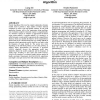Free Online Productivity Tools
i2Speak
i2Symbol
i2OCR
iTex2Img
iWeb2Print
iWeb2Shot
i2Type
iPdf2Split
iPdf2Merge
i2Bopomofo
i2Arabic
i2Style
i2Image
i2PDF
iLatex2Rtf
Sci2ools
121
Voted
GECCO
2008
Springer
2008
Springer
ASAGA: an adaptive surrogate-assisted genetic algorithm
Genetic algorithms (GAs) used in complex optimization domains usually need to perform a large number of fitness function evaluations in order to get near-optimal solutions. In real world application domains such as the engineering design problems, such evaluations might be extremely expensive computationally. It is therefore common to estimate or approximate the fitness using certain methods. A popular method is to construct a so called surrogate or meta-model to approximate the original fitness function, which can simulate the behavior of the original fitness function but can be evaluated much faster. It is usually difficult to determine which approximate model should be used and/or what the frequency of usage should be. The answer also varies depending on the individual problem. To solve this problem, an adaptive fitness approximation GA (ASAGA) is presented. ASAGA adaptively chooses the appropriate model type; adaptively adjusts the model complexity and the frequency of model usage...
Fitness Function | Fitness Function Evaluations | GECCO 2008 | Optimization | Original Fitness Function |
| Added | 09 Nov 2010 |
| Updated | 09 Nov 2010 |
| Type | Conference |
| Year | 2008 |
| Where | GECCO |
| Authors | Liang Shi, Khaled Rasheed |
Comments (0)

